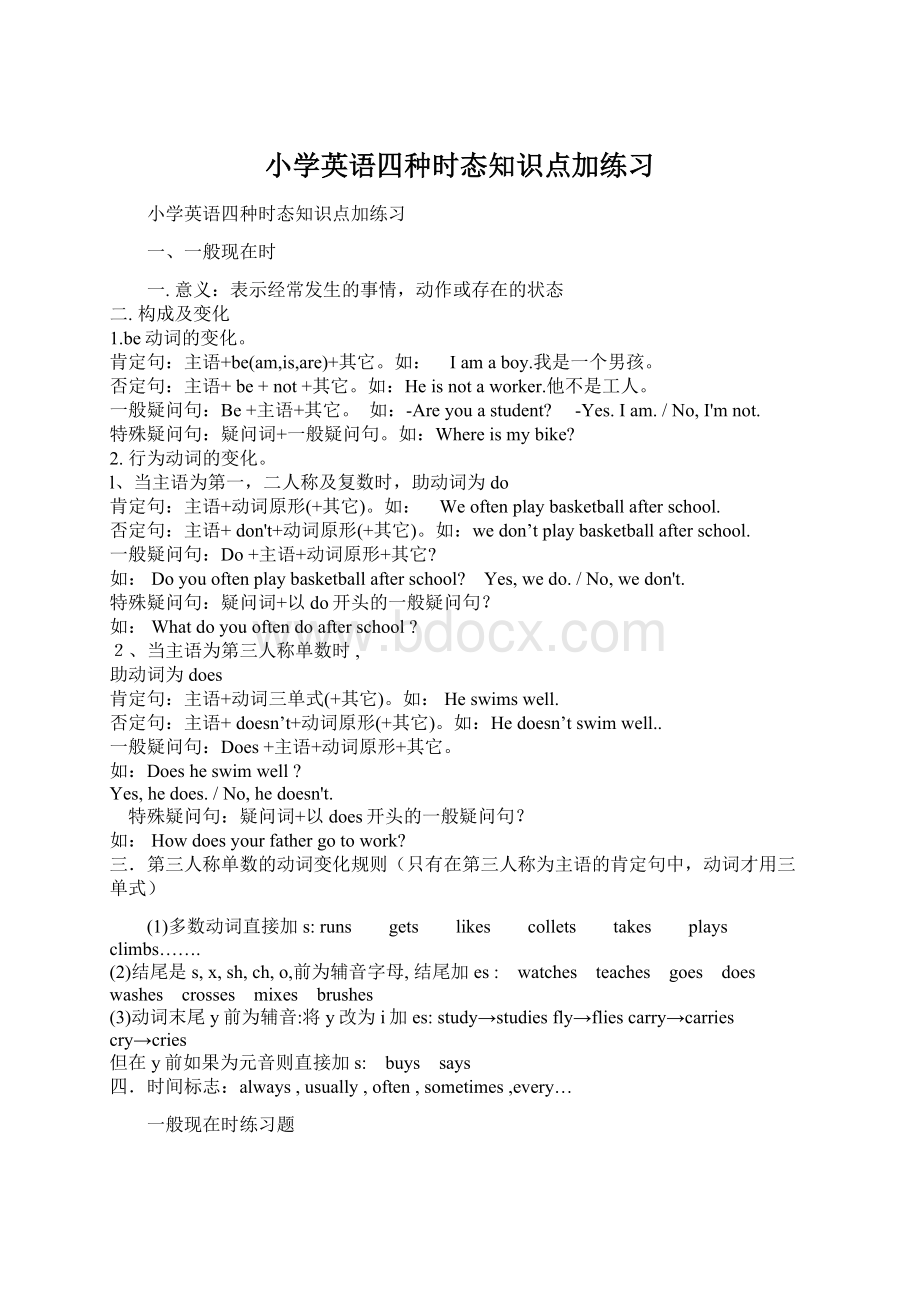小学英语四种时态知识点加练习.docx
《小学英语四种时态知识点加练习.docx》由会员分享,可在线阅读,更多相关《小学英语四种时态知识点加练习.docx(13页珍藏版)》请在冰豆网上搜索。

小学英语四种时态知识点加练习
小学英语四种时态知识点加练习
一、一般现在时
一.意义:
表示经常发生的事情,动作或存在的状态
二.构成及变化
1.be动词的变化。
肯定句:
主语+be(am,is,are)+其它。
如:
Iamaboy.我是一个男孩。
否定句:
主语+be+not+其它。
如:
Heisnotaworker.他不是工人。
一般疑问句:
Be+主语+其它。
如:
-Areyouastudent?
-Yes.Iam./No,I'mnot.
特殊疑问句:
疑问词+一般疑问句。
如:
Whereismybike?
2.行为动词的变化。
l、当主语为第一,二人称及复数时,助动词为do
肯定句:
主语+动词原形(+其它)。
如:
Weoftenplaybasketballafterschool.
否定句:
主语+don't+动词原形(+其它)。
如:
wedon’tplaybasketballafterschool.
一般疑问句:
Do+主语+动词原形+其它?
如:
Doyouoftenplaybasketballafterschool?
Yes,wedo./No,wedon't.
特殊疑问句:
疑问词+以do开头的一般疑问句?
如:
Whatdoyouoftendoafterschool?
2、当主语为第三人称单数时,
助动词为does
肯定句:
主语+动词三单式(+其它)。
如:
Heswimswell.
否定句:
主语+doesn’t+动词原形(+其它)。
如:
Hedoesn’tswimwell..
一般疑问句:
Does+主语+动词原形+其它。
如:
Doesheswimwell?
Yes,hedoes./No,hedoesn't.
特殊疑问句:
疑问词+以does开头的一般疑问句?
如:
Howdoesyourfathergotowork?
三.第三人称单数的动词变化规则(只有在第三人称为主语的肯定句中,动词才用三单式)
(1)多数动词直接加s:
runs gets likes collets takes plays climbs…….
(2)结尾是s,x,sh,ch,o,前为辅音字母,结尾加es:
watches teaches goes does washes crosses mixes brushes
(3)动词末尾y前为辅音:
将y改为i加es:
study→studiesfly→fliescarry→carriescry→cries
但在y前如果为元音则直接加s:
buys says
四.时间标志:
always,usually,often,sometimes,every…
一般现在时练习题
I.用下列单词的适当形式填空
1.Weoften___________(play)intheplayground.
2.He_________(get)upatsixo’clock.
3.__________you_________(brush)yourteetheverymorning?
4.What________________(do)heusually________________(do)afterschool?
5.Danny________________(study)English,Chinese,maths,scienceandArtatschool.
6.Mikesometimes__________(go)totheparkwithhissister.
7.Ateightatnight,she__________(watch)TVwithhisparents.
8.________Mike________(read)Englisheveryday?
9.Howmanylessons_________yourclassmates________(have)onMonday?
10.Whattime_________hismother_________(do)thehousework?
II.改句子
1.Doyouoftenplayfootballafterschool?
(改为肯定句)
2.Ihavemanybooks.(改为否定句)
3.GaoShan’ssisterlikesplayingtabletennis(改为否定句)
4.ShelivesinasmalltownnearNewYork.(改为一般疑问句)
5.IwatchTVeveryday.(改为一般疑问句)
6.Wehavefourlessons.(改为否定句)
7.Nancydoesn’trunfast(改为肯定句)
二、现在进行时
一、概念
现在进行时表示说话时正在进行或发生的动作,也可表示当前一段时间内的活动或现阶段正在进行的动作。
结构:
be动词(am/is/are)+doing
二、现在分词的构成:
1.大多数动词后可在动词后直接加-ing.
Eg:
carry-carrying,catch-catching,drink-drinking,enjoy-enjoyinghurry-hurrying,do-doing,read-reading,think-thinking
2.如果动词以-e结尾,则去掉-e,再加-ing,
如come-coming,have-having,make-making,ride-riding,write-writing,take-taking,use-using.
3.如果动词只有一个元音字母,而其后跟有一个辅音字母时,将此辅音字母双写,再加-ing如:
hit-hitting,let-letting,put-putting,run-running,sit-sitting.
4.如果动词有两个音节,且重音在第二个音节上,则末尾的辅音字母须双写,再加-ing,如:
forget-forgetting,prefer-preferring,upset-upsetting.试比较benefit/benfiting,differ/differing,profit/profiting,这些词的重音在第一个音节上,因此其末尾的辅音字母不双写.
5.以-ic结尾的动词,应先把-ic变为-ick,再加-ing,eg:
panic/panicking,picnic/picnicking,
但lie/lying,die/dying,tie/tying是特殊变化要记住.
三、句型结构:
1.现在进行时的肯定形式、否定形式、疑问形式及其回答,所有变化都体现在助动词be(is/am/are)上.
1)现在进行时的肯定形式:
主语+be(am/is/are)+doing+其他成分
Iamsinging.Theyarewriting.
2)现在进行时的否定形式:
主语+be(am/is/are)+not+doing+其他成分
Iamnotsinging.Theyaren’twriting.
3)一般疑问句及回答:
be(am/is/are)+主语+doing+其他成分
AmIsinging?
Yes,youare./No,youaren’t.
Aretheywriting?
Yes,theyare./No,theyaren’t.
4)特殊疑问句及回答:
特殊疑问词+be(am/is/are)+主语+doing+其他成分
Whatareyoudoing?
Weareplaying(要求就提问内容具体回答).
2.缩写形式如下:
Iam---I’mYouare---You’reHeis---He’sSheis---She’s
Itis---It’sWeare---We’reTheyare---They’re
3.说明:
不是所有动词都能用现在进行时态的,如:
see、like、want、know等动词往往都不用进行时态.
四.用法:
1.表示现在(指说话人说话时)正在发生的事情.往往与now,
atthemoment,atpresent,justnow,listen!
look!
等副词连用,以示强调.
Wearewaitingforyou.Whatareyoudoing?
Someone’sknockingatthedoor.
2.正在进行着的动作可视为未完成的动作:
He’stalkingtohisfriendsintheclassroom.
可用still一词强调动作的持续性
He’sstilltalkingtohisfriendsintheclassroom.
3.表示长期的或重复性的动作,说话时动作未必正在进行.
Mr.Blackiswritinganotherarticle.
Don’ttakethatbookaway.Yourfather’susingit.
SheislearningpianounderMr.Black.
4.现在进行时可用来表示不会长期发生的动作或情况,或被认为在短期内正在进行的动作或存在的情况:
What’syourbrotherdoingthesedays?
He’sstudyingEnglishatOxfordUniversity.
5.现在进行时也可以用来表示当前的动向:
Peoplearebecomingmoreandmorebeautifulthesedays.
6.表示渐变的动词有:
become,turn,get,grow,run,go,begin等.
Theleavesareturningbrown.
It’sgettingcolderandcolder.
7.与always,constantly,forever等词连用,表示反复发生的动作或持续存在的状态,往往带有说话人的主观色彩.
Youarealwayschangingyourmind.
8.现在进行时表将来
现在进行时(以及begoingto)可以表示为将来安排好的活动和事件We’respendingnextwinterinChina.用arrive,come,go,leave等动词的现在进行时描写行程安排,也通常有“将到达”和“将离去”的意思:
He’sarrivingtomorrowmorning.
9.当现在进行时表示某事发生的次数过多时,则有时含有抱怨,讨厌,赞扬等的意思:
Heisalwayssingingatnight,andwecan’tfallasleeplateatnight.
现在进行时练习题
一.用现在进行时完成下列句子:
1.______you__________(fly)akite?
Yes,_______.
2.______you___________(sit)intheboat?
3.______he_____________(talk)withme?
4.We_______________(play)footballnow.
5.What_________you__________(do)?
6.I_____________(sing)anEnglishsong.
7.What________he____________(mend)?
8.He______________(mend)acar.
9.Theseboys_________(play)tennisontheplayground.
10.Mymother______________(cook)inthekitchen.
11.Wecan’thelpyou,becausewe____________(have)classes.
12.________theboy___________(write)hishomework?
13.Look!
Thesebutterflies_________(fly)inthesky.
14.Listen!
Thegirl___________(sing)inthenextroom.
15.Thenaughtyboy__________(swim)intheriver.
二.选择
1.Look.Lucyis_____anewbiketoday.
A.jumpingB.runningC.ridingDtakeing
2.Thechildren_____football.
A.isplayingB.areplayingC.playtheD.playa
3.They______TVintheevening.Theydotheirhomework.
A.arewatchingB.can’twatchingC.don’twatchD.don’twatching
4.Listen!
She____intheclassroom.
A.issingingB.singC.tosingD.issing
5.______areyoueating?
I’meating______meat.
A.What,someB.Which,anyC.Where,notD.What,a
6.Isshe____something?
A.eatB.eatingC.eattingD.eats
7.Mydictionary___,Ihavelookedforiteverywherebutstill___it.
A.haslost,don’tfindB.ismissing,don’tfindC.haslost,haven’tfoundD.is
missing,haven’tfound.
8..Havingacomputerforpersonaluseisnoeasytaskbecausetechnology_______sorapidly.
A.ischangingB.haschangedC.willhavechangedD.willchange
9.Thebuilding_______,Ican’tstandthenoise.
A.wasbeingbuiltB.isbuiltC.isbeingbuiltD.builds
10.Ican’tcatchupwiththefashion,becausetheclothesstyle_______allthetime.
A.haschangedB.ischangedC.ischangingD.changed
一般将来时
一、概念:
表示将要发生的动作或存在的状态及打算、计划或准备做某事。
句中一般有以下时间状语:
tomorrow,nextday(week,month,year…),soon,thedayaftertomorrow(后天)等。
二、基本结构:
①begoingto+do;
②will+do.
三、否定句:
在be动词(am,is,are)后加not或情态动词will后加not成won’t。
例如:
I’mgoingtohaveapicnicthisafternoon.→I’mnotgoingtohaveapicnicthisafternoon.
四、一般疑问句:
be或will提到句首,some改为any,and改为or,第一二人称互换。
例如:
Wearegoingtogoonanoutingthisweekend.→Areyougoingtogoonanoutingthisweekend?
五、对划线部分提问。
一般情况,一般将来时的对划线部分有三种情况。
1. 问人。
Who例如:
I’mgoingtoNewYorksoon.→Who’sgoingtoNewYorksoon.
2. 问干什么。
What…do.例如:
Myfatherisgoingtowatcharacewithmethis afternoon.→Whatisyourfathergoingtodowithyouthisafternoon.
3. 问什么时候。
When.例如:
She’sgoingtogotobedatnine.→Whenisshegoing tobed?
六、同义句:
begoingto=will
Iamgoingtogoswimmingtomorrow(明天).=Iwillgoswimmingtomorrow.
一般将来时练习题
1. 我打算明天和朋友去野炊。
I_____________________haveapicnicwithmyfriends.
I________haveapicnicwithmyfriends.
2. 下个星期一你打算去干嘛?
我想去打篮球。
What___________________________________________nextMonday?
I__________________playbasketball.
What_________youdonextMonday?
I________playbasketball.
3. 你妈妈这个周末去购物吗?
是,她要去买一些水果。
_____yourmother_______________goshoppingthis___________?
Yes,she_________.She________________________buysomefruit.
4. 你们打算什么时候见面。
Whattime_______you___________________meet?
改句子。
5. Nancyisgoingtogocamping.(改否定)
Nancy________goingtogocamping.
6. I’llgoandjointhem.(改否定)
I_______go______jointhem.
7. I’mgoingtogetupat6:
30tomorrow.(改一般疑问句)
_______________________togetupat6:
30tomorrow?
8. Wewillmeetatthebusstopat10:
30.(改一般疑问句)
_______________meetatthebusstopat10:
30.
9. Sheisgoingtolistentomusicafterschool.(对划线部分提问)
_______________she_________________________afterschool?
10. Myfatherandmotheraregoingtoseeaplaythedayaftertomorrow.(同上)
__________________goingtoseeaplaythedayaftertomorrow.
用所给词的适当形式填空。
11.Todayisasunnyday.We___________________(have)apicnicthisafternoon.
12. Mybrother_______________(go)toShanghainextweek.
13. Tomoften______________(go)toschoolonfoot.Buttodayisrain.He______________(go)toschoolbybike.
14. Whatdoyouusuallydoatweekends?
Iusually__________(watch)TVand____________(catch)insects.
15. It’sFridaytoday.What_____she_________(do)thisweekend?
She______________(watch)TVand_____________(catch)insects.
一般过去时
I.一般过去时的概念
一般过去时表示过去某个时间发生的动作或存在的状态。
常和表示过去的时间状语连用。
如:
lastyear/week/night/month,yesterday等。
例如:
①Isawhiminthestreetyesterday.昨天我在街上看见他了。
②LiMeialwayswenttoschoolonfootlastyear.去年李梅总是步行上学。
II.一般过去时的构成
动词过去式的构成:
(1)规则动词过去式的构成有四条规则:
①一般在动词原形末尾直接加上-ed。
如:
look-looked。
②以不发音的字母e结尾的动词,去e再加-ed。
如:
live-lived。
③末尾只有一个辅音字母的重读闭音节,先双写这个辅音字母,再加-ed。
如:
stop-stopped。
④末尾是辅音字母+y结尾的动词,先变y为i,然后再加-ed。
如:
study-studied。
(2)不规则动词的过去式需特殊记忆。
am(is)-was,are-were,go-went,come-came,take-took,have(has)-had
read-read,make-made,see-saw,go-went,eat-ate,
III.一般过去时的几种句型
肯定句结构为:
主语+动词的过去式+其它。
如:
Hewenttothetoystoreyesterday.他昨天去玩具店了。
否定句结构为:
主语+didnot(didn't)+动词原形+